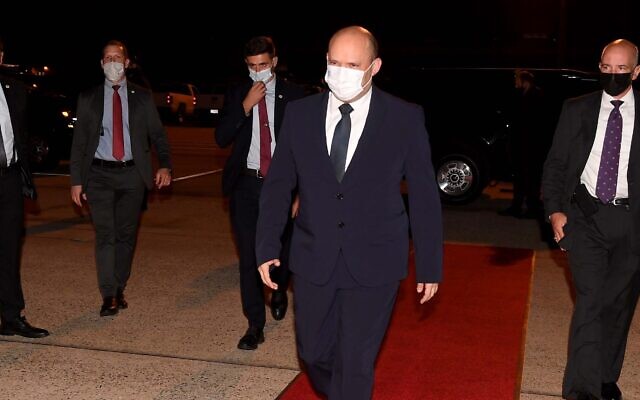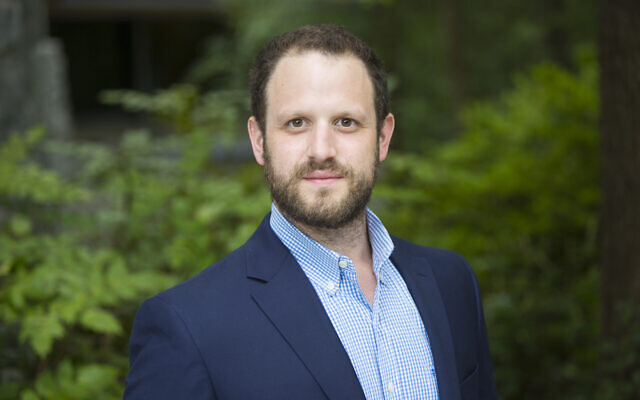Bennett Called Meeting with Biden ‘Successful’
Bennett was born the same year President Joe Biden first became senator.

For the first 40 years of his life, until he became a member of Israel’s Knesset, Naftali Bennett was a dual, American Israeli, citizen due to his birth in Haifa to American-born parents in 1972. On Aug. 27, Bennett sat in the Oval Office of the White House as Israel’s prime minister, conversing with the president of the United States – a historic development for someone who had also spent several of his childhood years in the U.S.
There was a lot weighing on this meeting for Bennett, who has only been prime minister for a few months, and who had succeeded a prime minister known for attracting the spotlight in Oval Office meetings. “Bennett was completely untested,” prior to this meeting, according to Eli Sperling, the Israel specialist for the Center for Israel Education at Emory University, now also a postdoctoral associate at Duke University.
The meeting had been delayed a day due to the tragic terrorist attack at the Kabul airport which occupied much of President Joe Biden’s attention, which may have been an advantage for Bennett. “In many regards, the postponement and amount of attention on the bombing in Kabul probably took off pressure on Bennett,” said Sperling.
Bennett called the top-level meeting successful. “We had a particularly warm and helpful meeting,” said the young prime minister. “Biden and I have developed a direct and personal relationship built on trust.”

Other than the specific agenda items on each leader’s list, the rapport between the two men was of utmost importance, especially for Bennett. Israelis see the relationship between the leaders of the two countries essential for their security. The previous prime minister, Benjamin Netanyahu, was known for making friends or enemies with the American presidents.
“We never know how the U.S. president and Israeli prime minister will do together, but they did seem to get along well,” observed Sperling. “Biden told Bennett to call him directly and Bennett invited Biden to Israel. This was a big win for Bennett and his domestic political optics.”
Bennett heads perhaps the most diverse government in Israeli history, encompassing left, right and center parties – including for the first time, an Islamist Arab party. Biden is not only aware of the precariousness of keeping that coalition government together, but he also shares the goal of keeping Netanyahu from returning to the premiership. “There’s an understanding on both sides that the coalition is fragile and it’s in the interest of the United States to prevent another Israeli election soon. The U.S. wants stability on all fronts,” said Sperling.
The agenda items were clear from the beginning. Israel asked for Biden’s support to replenish the missiles for its Iron Dome defensive system and for Israeli citizens to be included in the visitor visa waiver program. “Israel expended a large amount of rockets for the Iron Dome in May during the fighting with Gaza,” noted Sperling. Although Biden appeared to respond positively to the visa waiver question, Sperling said it wasn’t a “hard promise from Biden that will continue to remain unresolved.” He said the White House might keep that as leverage in the future.
The biggest item and concern on both leaders’ agendas was whether the United States will rejoin the multi-national nuclear agreement with Iran that former President Barack Obama joined, and former President Donald Trump withdrew from. Israel hopes the U.S. will remain outside that agreement. Sperling pointed out that unlike in his meeting with the recent Israeli President Reuven Rivlin two months ago, Biden told Bennett that if diplomacy fails, the U.S. would “pursue other options.”
Sperling also noted that it was clear that the “Palestinian question was put on the back burner,” without the two leaders calling public attention to it. “The U.S. is in a difficult position right now because there’s a lot of divisiveness in the U.S. about Israel. So, everyone was on their best behavior. And, at the end of the day, the relationship between the president and prime minister is what matters,” said Sperling. “Bennett had to ensure that the meeting went well.”
- Israel news
- News
- Jan Jaben-Eilon
- Israel
- Knesset
- naftali bennett
- Haifa
- Oval Office
- White House
- Prime Minister
- United States
- Eli Sperling
- Center for Israel Education at Emory University
- duke university
- President Joe Biden
- Kabul Airport
- Meeting
- Benjamin Netanyahu Leaders
- Islamist Arab party
- Iron Dome
- Visa Waiver
- Gaza
- Iran
- President Barack Obama
- President Donald Trump
- diplomacy
- Palestinian



comments